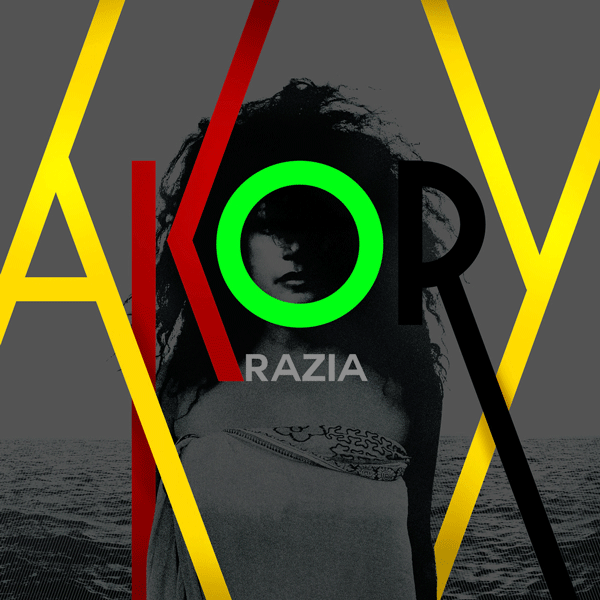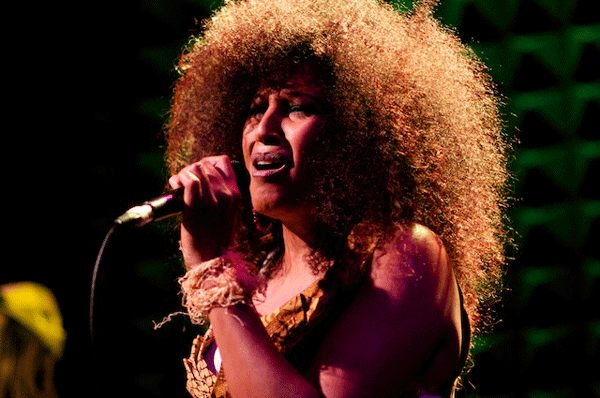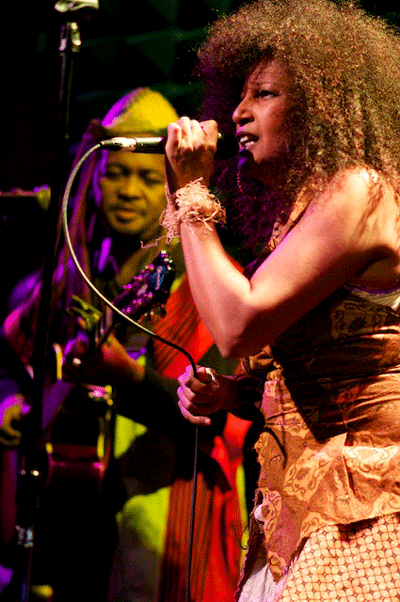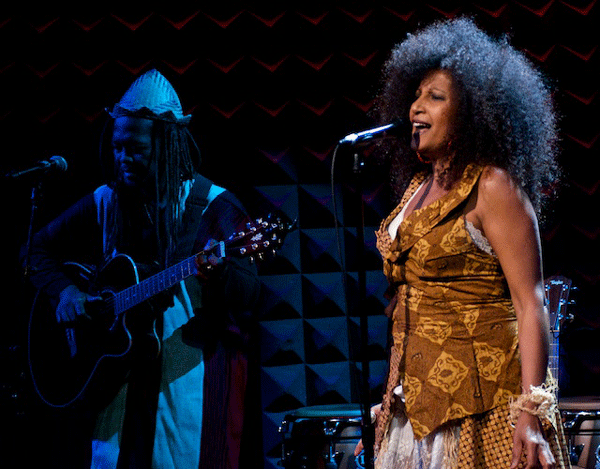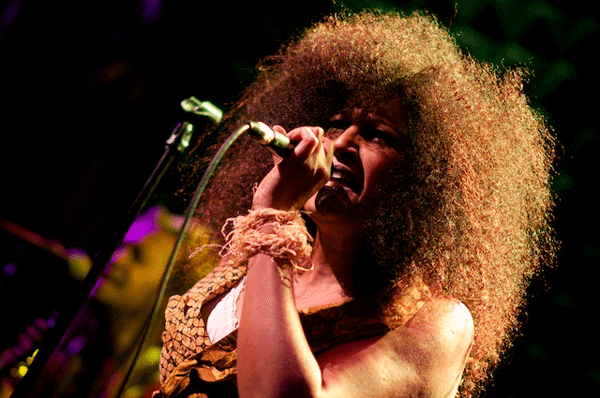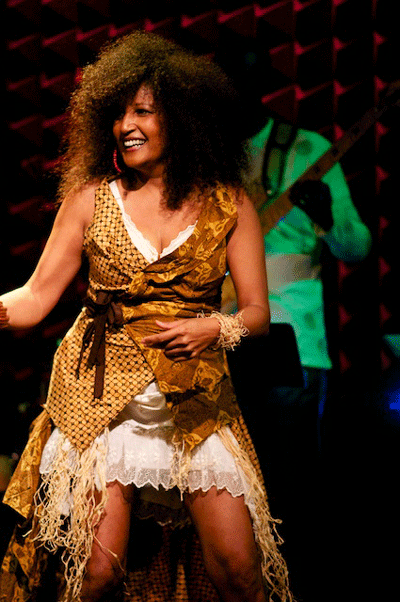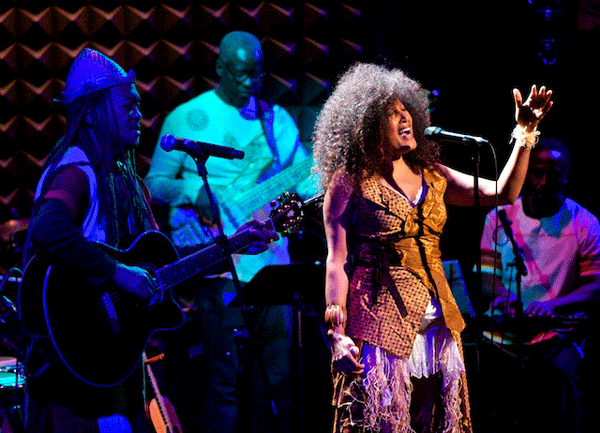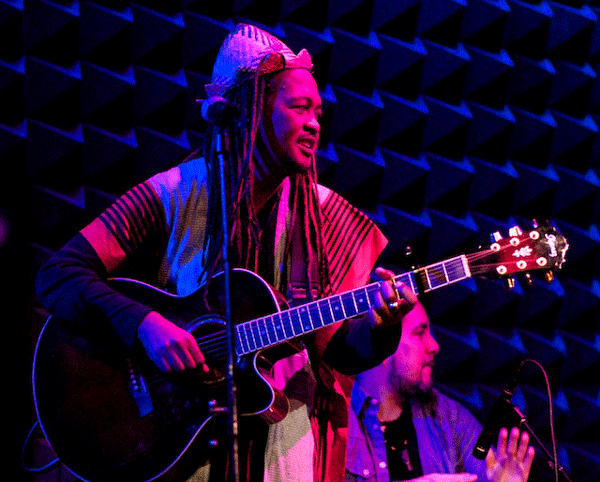Razia is a singer/songwriter/bandleader from Madagascar who has made her home in New York City. Her second album, Akory, is an adventurous exploration of musical styles and social issues in Madagascar. It was created in Antananarivo, New York, and Paris. Afropop’s Banning Eyre sat down with Razia in her New York home, the night after her album release concert at Joe’s Pub, to discuss the new work. Here’s their conversation.
Banning: First, tell me about the CD title, Akory.
Razia Said: Akory. It means, “What now?” or “What next?” And also, in Malagasy, Akory can mean, "What's up?"
Ah ha, because I remember in Madagascar, hearing people using this word as a greeting.
Exactly. What's up?
But why did you pick that title?
Because a lot of my songs have the word “akory” in them. It's what I meant to talk about in this CD. OK, after my last CD, Zebu Nation, what is next? We put this awareness about environmental destruction in Madagascar out there. Now what are we going to do about it? Let's stop just talking about it. So what's next? We should be doing something about it.
One song has the word akory in its name.
Yes. “Akory Tsikaby” that song is about a cyclone, actually. It's kind of a way to talk about the fact that the destruction by the cyclones of the environment in Madagascar is getting worse and worse because there are less and less trees to stop the wind from getting stronger. We have cyclones in that region, and they are becoming more and more powerful. There is no natural stop. There's no more forests. They are destroying much more than they ever destroyed before.
I heard the cyclones were very bad this year.
Actually one of the musicians died. Recently. Felicien is his name, and he became famous because he did something called Copie Colle. It's something they have on television where you imitate a famous singer from Madagascar. So he imitated Theo from the group Mikea. He had the look, he had the voice, he had the whole thing, so he did that, and he became famous with it. And then during the cyclone that happened… Really, it was very strong in the Antananarivo region, and his wall collapsed on him. These walls are made of mud. And it rained so much that the wall just kind of collapsed, and that's how he died. So that was really a huge tragedy, and he became kind of a national hero. His funeral was attended by many. It was a huge thing in Madagascar. That was just about a month ago.
So the song is talking about how are we going to survive? How are we going to manage this whole cyclone destruction situation? Because it is destroying the forest.
On this whole issue of the destruction of the forest, one of the interesting things I heard from one of our scholars when we were making our series on Madagascar last year was that the biggest destruction the forest is actually being done not by individuals but by big companies. There seems to be a kind of conspiracy to blame individual people, often people who have been displaced to live on land that isn't their original land. So you have created a disconnection between people and their land, and now you're blaming them for destroying the land, when in fact it's you.
Oh yeah. We know that the multinationals are behind a lot of it. Big mining companies and all kinds of people are interested in Madagascar. Big, big giant powers are involved in that, definitely. And there's a total mafia of people who are involved. So, no, it's not just the people. Of course. But the people are the ones who are hired to actually go and cut the wood. So if we could have the power to say, "No, we are not going to cut the wood because we want keep our forests intact," it might be a little bit difficult for them to get anything done.
Yes. Raising consciousness is important.
Exactly. Raising consciousness. That's what it's all about. Educating people about the cycles of this forest in what's going on and what's going to happen to these forests. We have already got desertification going on in the south of Madagascar. Slowly it's climbing up. Up in the highlands, it was rain forest heaven. And all of a sudden we are having some droughts and times when there's no rain. We have a lot of wells that don't have water in them anymore. People have to climb for an hour walk uphill just to get some water. There aren't enough roots to actually hold the water there. So, yes, if it was an easy thing to solve, it would be solved already. But it's very intricate, complicated, not made easier by corruption and all the people who are interested in Madagascar.
We have so much wealth, so much in Madagascar. And other people who are greedy and want to get a piece of that come and just destroy it on an environmental level. They are going into the mines. They're going to natural gas. They're going into everything that is related to Madagascar. And that is in a way the sad thing about it: if we were a poor country, actually, nobody would be interested in us, and the country would do much better. But because we are so rich in so many ways, we attract attention.
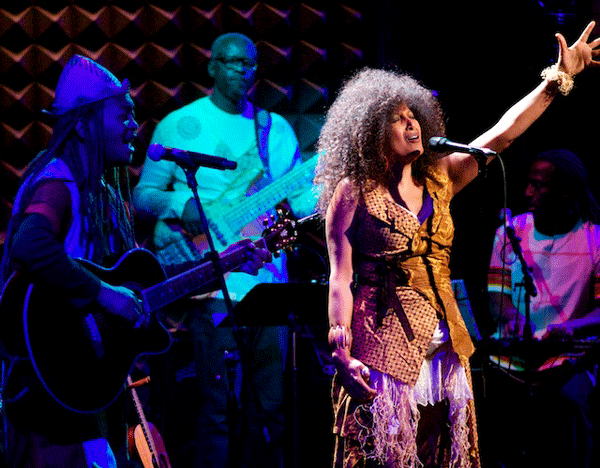 Razia at Joe's Pub (Eyre 2015)
Razia at Joe's Pub (Eyre 2015)
That's what people used to say about Mali. Everything was so cool on the social and cultural levels because they didn't have much economic wealth to exploit. That was supposedly its blessing. But we see things have changed now. Anyway, coming back to your record, let's talk about the beautiful opening track “Taranaka Afara.”
“Taranaka Afara” this is the future, the future of our children. “Taranaka Afara.” It's a requiem for a tree that is being uprooted. It's like a burial. It's in a coffin. And it's carried high on her shoulders. That's how we carry dead people in Madagascar. It is just the thoughts that are going through the tree’s consciousness, or whatever you can call it. And then of course in Madagascar we believe in these things. We believe in animism. So it's a little bit that. It's the tree that is talking and wondering what it is doing here. Why was I uprooted? Why am I separated for my family? What are these people doing?
The melody of that song reminds me of an old song that the Senegalese group Toure Kunda used to play.
Oh yes, yes. A friend of mine told me that also. You are the second person that told me that. I was talking to some people, kind of fishing. Does this remind you of something? Because sometimes you doubt yourself. You write things, you think this is great, but is it original? So I'm sure there's an influence of that, because I listened to that song when I was younger, when I was living in Paris. So there's a reminiscence of that.
It creeps in. It is a beautiful song. And the first time I heard it was right here in your garden when you played it with your band at a party.
Yes. That's right.
Let's talk about “Zanako,” such a sweet song.
Yes. “Zanako” is about the children. “Zanako” is a child. It's again talking about the future of our children. As I was saying at the show yesterday, there is such a huge percentage of children in Madagascar. The population of children is just getting bigger and bigger and bigger. It's frightening, because the country is becoming poorer and poorer and there are more and more children to feed. And all these children. What are they going to do? We don't have any kind of plans for them. even just for their survival. And I speak a lot with people. I work with people from UNICEF. They always ask, “What is going to happen to all these children in Madagascar? The rate is growing so fast. And there's not enough contraception. They're going to take over.” In about 10 years, and it's going to be very interesting to see what happens. But I think we have to really get ready for that. These kids are going to be 18 and start looking for work, and there's going to be no work, so that means crime and all kinds of negative stuff.
Wow. Does your song talk about the contraception issue?
No. It's talking more about how we have to cherish our children. That's why it has this sweet quality about it. Because our children are our future and our lives.
We have to teach them right.
Exactly. And keep something for them. If we have more forests, then we could have more tourists coming to Madagascar. That would be fantastic. We should be attracting tourism like crazy. This is such a beautiful country. We have so much diversity in landscape, in people, in social culture, in music. Everybody wants to go to Madagascar, but everybody's a little bit scared also, because it's the unknown, and it's never really been cited as the safest place to go, especially lately. But it's the sweetest place. We don't have a violent nature or anything like that. Whatever happens on the political or multinational levels and all these people who are bringing all this negative energy, it's really destroying what actually should be the pride of Madagascar.
Razia at Joe's Pub (Eyre 2015)
How about this great tsapiky song, “Baraingo”?
“Baraingo.” Now we are getting a little bit more political. “Baraingo,” we go one step forward, two step backwards, what have you guys decided for us? Make up your minds. It's all about speaking to political people, because Malagasy people unfortunately put so much emphasis on this political saga. They are so taken by it. At the same time, they are not really reacting. They are just submissive to what's going on. And so this song is more challenging and saying, "OK, make up your mind." For a long time we had a president who was not really a president. Now we have a legitimate president, but there are still problems. It's all around greed. Everything is surrounded by greed. So this song is just saying, "OK. Where are we going? Are we going left, right, forward, backwards? Lead us the right way.”
Musically that one and the last song, “Nifankahita,” I hear…
Well, this is tsapiky, with Teta.
Teta, the amazing tsapiky guitarst. So he is playing on both of these songs. He’s terrific.
Yeah. I'm going to be playing with him in Tulear in May. I'm going back to Madagascar in May for a series of free concerts, and hopefully will end up in Reunion Island as well after that. In Tulear, we’re going to play at this new place right next to the Alliance Francaise. They've opened a cultural space there.
Razia at Joe's Pub (Eyre 2015)
Oh, yes. That looks great. We saw the beginnings of it as a construction site last year.
It's beautiful now. I've seen pictures. So we will be there on May 12, with Teta and Jean Pisou. Do you know the accordionist Jean Pisou? I think he's the one who inspired Regis Gizavo. So he's pretty far up there.
Let's talk about the song you wrote for your father-in-law, "Papillion.” That’s French for butterfly.
Yes. This is for my stepfather, my late stepfather who is French, and that's why I decided to do that song in French, even though it's kind of a pin drop in the middle of all this. People said this is a Malagasy album, and there's a French song? But I felt I really had to do it in French. He was a butterfly collector, and he was fascinated by that. We used to go when I was little in Gabon in West Africa. I used to go with him on Wednesdays looking for butterflies. We had some very interesting adventures. We would look for elephant poop, because that's where the butterflies would go, on top of those. So I had a fun time with him, and I just wanted to write something that would stay. For him.
That's lovely. He must've had a good time with butterflies in Madagascar.
Yes, yes in Madagascar. But he spent his time in West Africa.
He didn't live in Madagascar?
Not at all. He just came on vacation. He lived with my mother mostly in Gabon, in West Africa.
So you were born in Madagascar, and then your mother married him and moved to Gabon.
Exactly. I was born in Madagascar and stayed there till I was 11, and then my mother married my stepfather and they both moved to Gabon. He used to live in France, and then they met in Comoros Island. So I spent a little bit of time in Gabon with them. And a lot of that time was a lot of fun because he was such an adventurer. We would go in the Land Rover looking for these spots. Sometimes we would sleep in tents and wait at night with projectors so we could attract these butterflies and pick which ones he wanted.
I mean for me, who was between the ages of 11 and 14—that's when I stayed there, before I went to boarding school in France—it was just fascinating. All of that. The worst part was when he was injecting these butterflies. Because you have to immortalize them eventually. That was not my favorite part.
That’s tough for a little girl.
Yeah. But going to look for them. That was a wonderful experience.
And the song itself starts in this kind of French art song mode, and then it goes into a rhythmic part at the end.
Yes. Well I didn't want it to be just remaining like a sad song, because the beginning is more of the reality of losing him. Because we were really close. But at the end, I wanted to keep with the memories, the fun memories. So it shifts from the feeling of loss into the fun memories.
The celebration.
Exactly.
Razia at Joe's Pub (Eyre 2015)
Nice. And you do have a song in English too, “Gny Lalagna.” This one has D’Gary playing guitar on it.
Yes. “Gny Lalagna” is “the way.” It's just talking about the fact that we know the way. We know the way we should go. We have a very clear idea of what we should do and what we should not do. So let's just follow our hearts and follow the right way.
Let's talk a little bit about the process of recording this record.
Well, the songs are written, most of them, here in this house, where we’re sitting right now—just with a guitar and me writing a song, like “Zanako,” or with my husband, Jamie, writing “Taranaka Afara.” We wrote that together. And then we went to Madagascar. I did the same process I used for my first CD, Zebu Nation. So recording from home where I feel comfortable, creating the melodies here, bringing it to Madagascar, and then in Madagascar, I got a band together, and this time I got Teta, Johnny Bass, Rajery. Rajery is playing the valiha (tube zither) on “Zanako.” Daniel Ramaroson was on the marovany (box zither). I wanted to have these really endemic musical instruments, like the marovany, and Surgi on the lukanga (fiddle) on “Kajio” and “Gny Lalagna.”
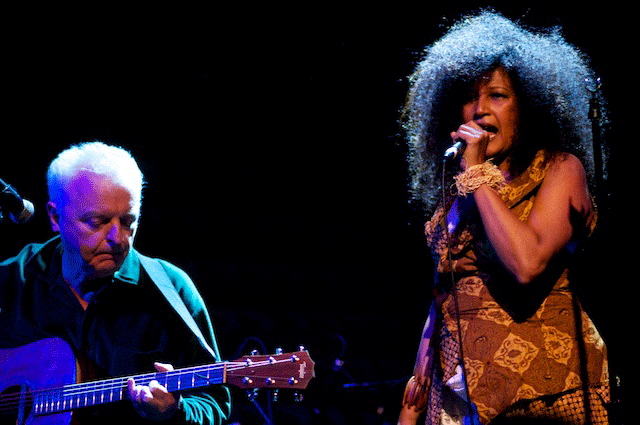 Razia and Jamie Ambler (Eyre 2015)
Razia and Jamie Ambler (Eyre 2015)
Then I got them all together. We played for about a week in Studio Mars, which does not exist anymore. We played there with Bivy, who is the engineer at Studio Mars, but also a super talented guy. He plays amazing guitar. He played a few guitars in there too, so we got that group together, and then with Rajery who helped me out a lot in the process, we turned the songs into Malagasy rhythms. We would decide together, “This one should a malessa. This one should be tsapiky." I've always said I want to represent all of Madagascar. I don't just want to do one thing. So we get little bit of salegy taste, tsapiky taste, bawedza. A little bit of everything.
And then we started the process of recording them. I was, let's say, 70 percent happy with what we recorded. And then I brought it to Paris where we recorded Regis, because he's based in Paris. And the voice of Theo was also in Paris because he happened to be there in concert. On “Kajio,” he and I have a duo. That was done in the same studio where we recorded Regis.
Then I brought it all back here, back to New York. Then we listened to it with Jamie and Nir Graff, who is the engineer on the album. Nir would say, "I think this was not recorded well. I can't hear the click. Or they're not following the click. We have to redo some stuff." And sometimes there were songs that we felt like were not strongly enough delivered. We need to something that would give it more kind of New York umph. Like on “Taranaka Afara.” So we said, “Let's get the New York cats to give that energy of New York in there. So then we got Michael Olatuja, and Harvey Wirht, who is my musical director.” And we got Radé, David, involved. He's my vocal arranger. And so we all got together and we rerecorded the parts that we felt it needed more. And that's how it happened. And then we do the whole process of editing here. "Elu Izaye" is mixed with the same guy, he's amazing, Godfrey Diamond. I like to work with the same team. And then we mastered with Leon Zervos, who used to be at what's the big mastering studio here? Sterling. And now he's moved to Australia, at Studio 301. So then we sent the album to Australia. It's been traveling!
And it's not over. We got all of that done, we thought, OK, the backup vocals should be more ethnic. So I had the whole thing sent to Theo, who put some other backing singers on it, and he sang backup also on a lot of the tracks. I was there for some of those recordings, and then we did the editing here in New York.
Razia at Joe's Pub (Eyre 2015)
An elaborate process, but it came out well. All that work paid off.
I really love the process. For me, it's about the music, but it's also about getting the vibes of different places. And it's about the traveling. To be able to be involved here in New York, and with people at home in Madagascar, and in Paris—this whole journey is what I bring into the album. It shows us really that we are one world. We are all connected. So to do it that way, it's very nice. Even though sometimes I dream of having a chance to record something just in one place, where we just stay in one place, I don't know, in Morocco, somewhere exotic. And just close ourselves in and work for a month solid and recording do everything.
Yes, it would be interesting to do it in a whole different way, wouldn't it?
You know that feeling when you go somewhere, and pick up some sounds from Madagascar or Mali or wherever you go, it's about the whole experience, what you bring to the people.
Yes, of course. I would say there are two things about this record that make it very different from any other Madagascar record. Part of it is this process of recording in all these different locations. But there's also something that goes back to the beginning, to the songs themselves, just you, or you and Jamie, sitting here writing songs. You create songs that sound like Malagasy songs but their structure and their melodic flow and arrangements are different than any pop music there. You have A-sections and B-sections, or a minor melody followed by a major melody…
Yes. I know. And I have to say, when I brought Zebu Nation to Madagascar and Medicis, our accordion player who passed away a couple of years ago, who I loved dearly and had a tragic death: he was stabbed on the street in Antananarivo. But when I brought that music to him in Madagascar, he said to me, "Wow, I've never heard structures like that. Usually we just go, and we go. We unfold whatever direction we’re going to go. We don't have verse and chorus, B-section…" He was totally fascinated by the whole process. He thought it was really interesting. And for me it was the first time I fully realized that this was a totally different way of writing. He said, "Yeah, completely. We don't write like that."
So yes, but that I think is coming from the Jamie part. He's English, so he's coming more from the approach of writing songs as opposed to writing a groove and then putting something on it. There's no change. In these music sometimes you have three chords and it just goes on. I mean, it's great too. I love it. That trance stuff. But this is much more of a song, something that actually I think people will remember the melody, and they can sing along. When you have this groove music, it's great. It's great to go dancing. But then five days later, you don't really know what you heard.
Razia at Joe's Pub (Eyre 2015)
So the complexity comes from working with Jamie. But it also must come from all the listening that you've done in your life.
Of course. Because I left Madagascar when I was 14, and even when I was in Madagascar, I was very much listening to the Beatles and James Brown, and after that when I was in France, to Bob Marley. And also I spent a fair amount of time in France, so there's a bit of French chanson that I probably absorbed at that time. So it's a combination of all my traveling, all the steps in my life.
It makes for very unique music.
People in Madagascar are starting to know me and appreciate me. I have actually a really nice fan base in Madagascar now, people who are thanking me for opening the Malagasy music to the world. Because they say this is the way that maybe people will be interested in knowing a little bit more about our music. Because the way we did our music, most of the time up to now, is these really very traditional and rootsy things that people cannot necessarily relate to. But a song with a melody, they can actually relate to that more.
Your songs sound like popular songs because of that structure. But I bet those musicians don't know what hard work is to make recordings like that, do they?
It's true, it’s a lot of work making music like that, rather than just letting the band play loose and go and then I come on top. I'd love to do that too, though. That's one of the plans that I have. I’m going to go in the south now and we’re actually going to start working on the next concept.
As you know, Afropop did a three-part series about Madagascar music last year. Many fans of Malagasy music let us know they were so appreciative and excited, but I'm not sure how much we moved the ball in terms of bringing in the uninitiated. It's surprisingly hard to get people in the general audience to appreciate this music. We were hitting everything—salegy, tsapiky, hip-hop, traditional music. But I think that with Madagascar, it's harder than with West Africa, because you don't have the same kind of historical connection. The connection through the history of slavery has made us sort of predestined to understand those musical idioms. West African rhythms and melodies are in our DNA.
I know. I had an interview with Canadian radio yesterday, and he was asking me, "Why don't we hear more Malagasy music? It doesn't come across here." And I was telling him this. It's so far away. We have such different rhythms. This 6/8 rhythm is something that people here haven't really absorbed yet. And he said, "Well, we have music from Mali and Senegal…" And I said, “Well, you've been communicating with that world for much longer. It's closer.” I never really thought about the whole slavery thing. But that's also true. Absolutely.
It was people from places like Mali and Senegal who ended up in New Orleans creating the blues. That's oversimplified, but there's a basic truth there. West African DNA is already in our blood. But it's a little bit harder to get to music from Zimbabwe, or Madagascar.
That's true. But once you get it, you're in it. But to get in it, it's true, it's not an easy thing. I don't think we really make it easy for people. It's not necessarily approachable. You look at an artist like Ismael Lo. It's so much easier for Western ears to understand that kind of melody.
And it works the other way, because people in Senegal have been absorbing all kinds of music from here as well, from r&b to Latin music…
That's right. Exactly. Madagascar has been kind of separate. It's this big island that has been separated from the big continent of Africa, and somehow just kind of isolated themselves also on the musical level. So we have this richness that has kind of stayed within ourselves. It may be made a little bit of a cross over to France, but not much to anywhere else. Not even in Africa, other parts of Africa.
It is its charm, but also its challenge.
Yes, it's been a difficult thing to kind of spread it, but I'm hoping that these songs that are more melodic and pop-like, I hope that people will be able to relate. I hear now, my friends, when I go to their places, they’re playing my CD through the whole dinner. I say, “Oh, my God." They say, “Yeah, we love it." So maybe there's hope for Malagasy music to go over the border.
Razia at Joe's Pub (Eyre 2015)
It's worth the fight. You are doing exactly the right thing. I want to talk a little bit about your band—such a New York band. People from Surinam, Colombia, Senegal…
And Madagascar. Radé, the guitar player. That is the one thing that I have to stick to. I promised myself I have to keep that intact as much as I can. Everything else can vary, but that Malagasy guitar is vital to my music, what it gives on stage. And now we are going to play in Canada with Madagascar Slim, and another artist called Dieux Donne.
I’ve heard him. He’s good.
Oh you know him? Well, both those guys are going to play with us on Sunday in Montréal. So I really insist on my guitar being Malagasy. I've been playing with our drummer Harvey Wirth for almost five years, and yesterday there were some new components to the band. Because Harvey is now the musical director of the band, he decided to play with Etienne, who is a keyboard player. I didn't even know he played accordion, and then I found out that when he was 10 years old, he was playing accordion. He just brought this accordion for me, to play with me. I couldn't believe what he was doing. He was playing so well, all these accordion things that are so Malagasy. I was very impressed.
So he had never played accordion with you before?
No. And we were all impressed. We're all looking at him. “You could be Malagasy! You come to Madagascar for a month, and you’re going to play like a real Malagasy person.” But I like this combination. Because in New York you have these amazing musicians, especially in a month like February. They are all available because there is not much going on. They're all in New York, so it's great to grab them and do that. You know, this was just to rehearsals and we went on stage.
Tell me more about that New York energy and what it has brought to your music.
The New York energy is definitely a different energy. We've been playing now with a band in Madagascar. I have a band in Madagascar that Harvey trained for this album, and then we have a band in France with some French people and Malagasy people. And then we have this band in New York. The band in New York just has this… I think because there's so much competition in New York on a high level. The guys really want it. The urgency is felt in the way they play. And for me that's really important. In Madagascar, they are very good at playing the traditional stuff, the marovany, but as far as the delivery and the presence and the urgency of the music, I think New York is the best place to get it.
And then the guys are so nice and simple. Easy access. In places like France, the guys who are the really good cats, they have a little bit of an attitude I think. Where in New York, it's really down to earth. I was speaking about that with Samuel Torres, who played percussion with us, an amazing percussionist from Colombia. I asked him if it's hard for musicians here. Not much work. And he said, “Actually, the most interesting stuff I do is in Colombia, playing with the Philharmonic and all that, but you know, I love to be in New York, because you get exposed to so amazing musicians from all over the world. Like tonight, I'm playing with you. Malagasy music! And tomorrow night I'll be playing Malian music. And then the day after something else." So there's all these mixes of people and it's very cosmopolitan.
So even though my heart is very much attached to Madagascar, for me, New York is where I find really what I need to actually make myself function. So I think this will remain always my base. And because there is that richness of the music that is very accessible.
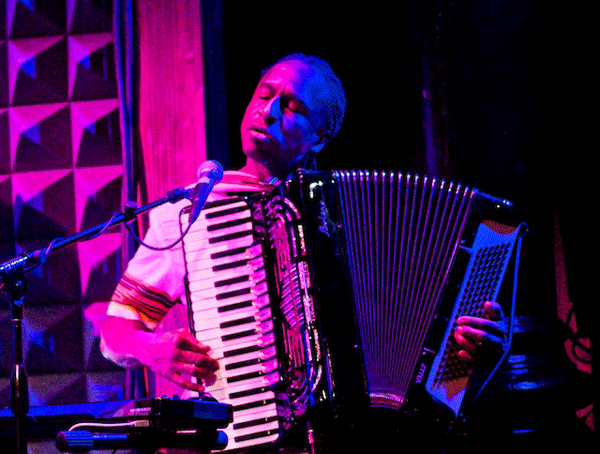 Etienne on accordion at Joe's Pub. (Eyre 2015)
Etienne on accordion at Joe's Pub. (Eyre 2015)
That's perfect. Thanks so much, Razia. There is something special about the African music that's being created in New York, but also in other American cities. There are interesting scenes around the country. And we have watched this process over the years. At first, it was kind of uneven. Very few people knew all these musical languages. But now, people are so much more familiar and so much more able to cross these boundaries. You get a much higher quality. It's music that comes from Africa, but it's been transformed through the American prism.
Yes. It's too bad that the "world music" doesn't have more of a platform here in the States. Because I think this would be a great place to create amazing world music.
Well, it does get created. It just doesn't get rewarded very much, does it?
Exactly exactly. That's exactly what I mean.
Thanks, Razia. And good luck with Akory.
Radé on guitar with Razia (Eyre 2015)









